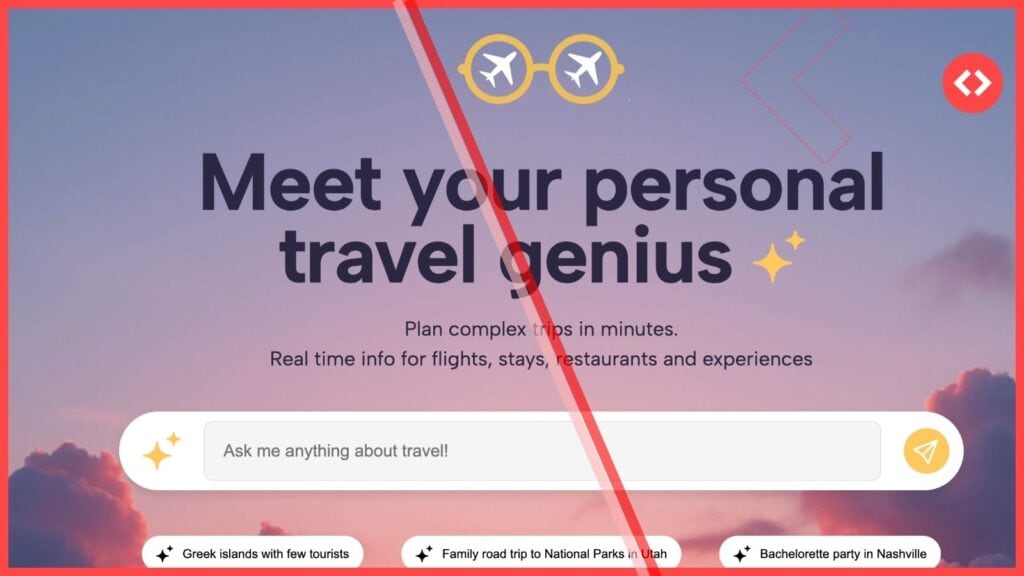After AI-powered search tools like ChatGPT and Perplexity, the next battleground for trip planning is messaging apps, the places travelers already use every day. We tested GuideGeek, a free chat-based AI from Matador Network, to see what planning inside chat looks like, and what it could mean for short-term rental managers.
Why WhatsApp? Planning Moves Where Travelers Already Are
AI travel tools are no longer confined to browser tabs. The next wave is taking shape in chat environments, WhatsApp, Instagram DMs, and Facebook Messenger, where people already spend their time coordinating trips, chatting with friends, and messaging hosts.
One of the first tools to explore this frontier is GuideGeek, which bills itself as “your personal travel genius.” On its homepage, users are invited to plan trips, find restaurants, and explore destinations through chat. Buttons prompt them to “Try on WhatsApp,” “Message on Instagram,” or “Chat on Messenger.”
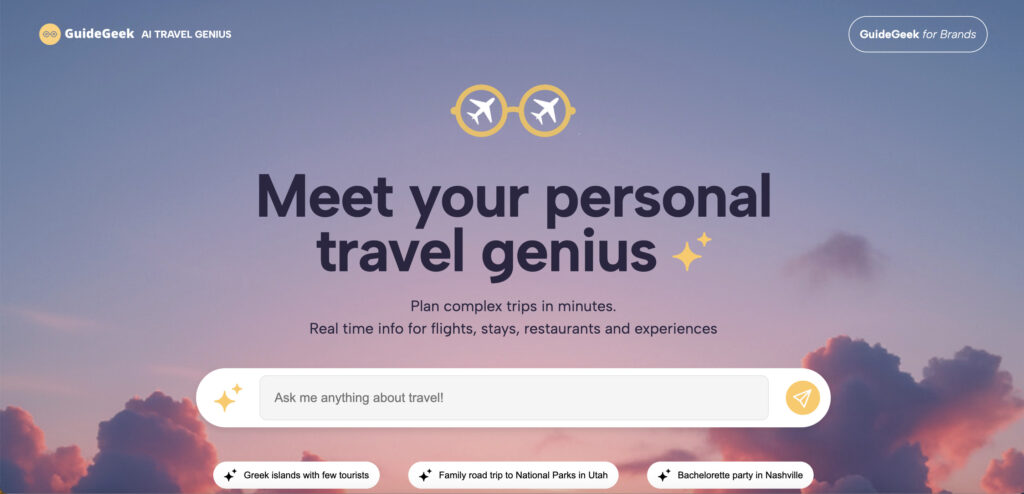
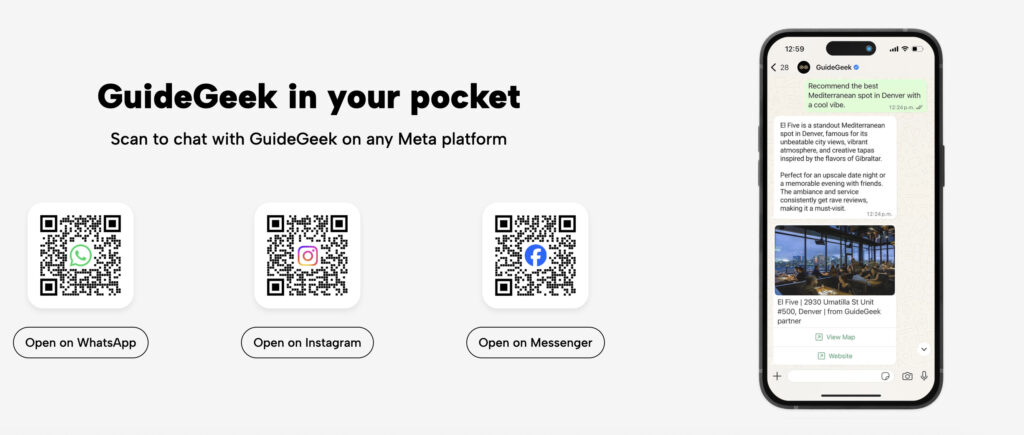
This approach makes sense. In European markets, WhatsApp is more than just a social tool; it’s an everyday utility. Travelers use it to coordinate plans and stay in touch, while hosts rely on it to communicate directly with guests before and during their stays.
What GuideGeek Reveals About Planning in Chat
In our WhatsApp test, GuideGeek handled open-ended prompts smoothly, for instance, “a quiet week in December within a short flight of Lisbon.” The assistant responded instantly with suggestions grouped by mood and distance, such as winter escapes like Lapland and Prague, sunny destinations like the Algarve and Tulum, and cultural cities like Marrakech and Kyoto. It presumably detected the phone’s Portuguese country code and began responding in Portuguese before switching to English when prompted.
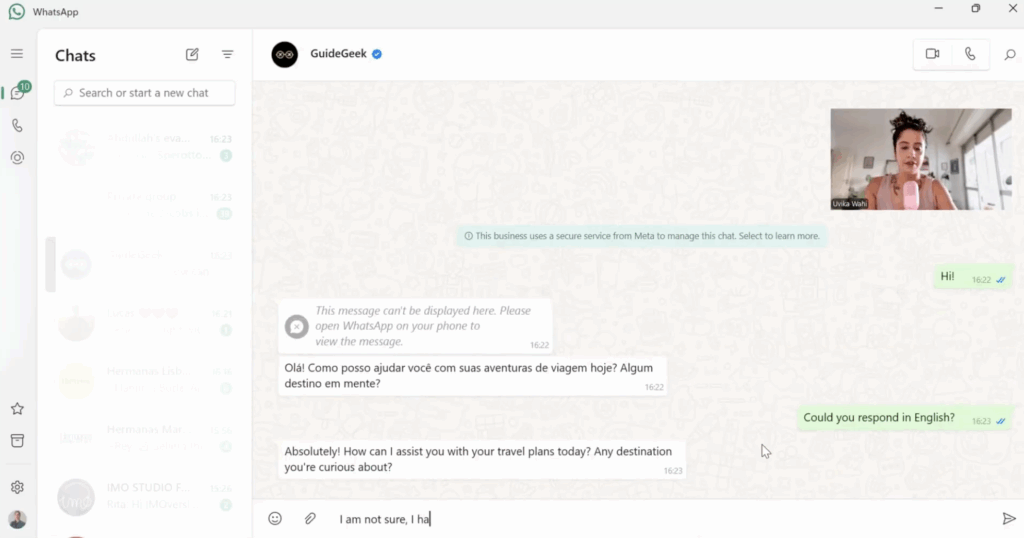
From there, the conversation flowed naturally into stays. In our Seville test for a couple’s trip, GuideGeek first returned Airbnb listings with direct links; when we asked specifically for hotels, it switched to boutique options and pointed to Booking.com, Expedia for pricing. This suggests the assistant adapts to phrasing and context, but it remains unclear whether the tool has a clear preference for one accommodation type or even platform or another.
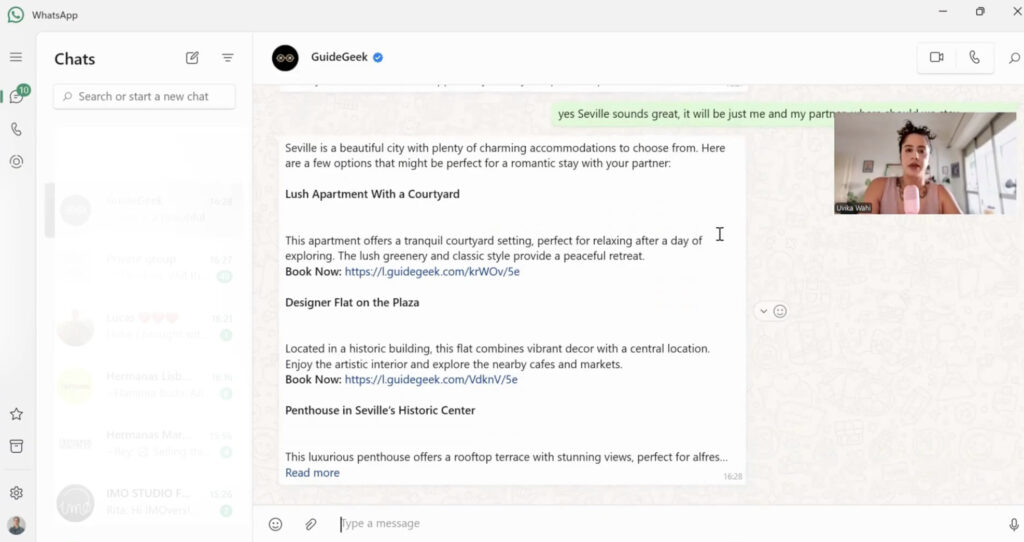
Inside WhatsApp, GuideGeek responds conversationally to travel queries, in this case, recommending Airbnb-style apartments for a couple’s stay in Seville, complete with short descriptions and booking links.
How Questions Shape What Travelers See
One interesting pattern is how much query phrasing influences results. When travelers ask open-ended questions like “Where should I stay?”, GuideGeek tends to surface Airbnb listings first. But when the question specifically mentions “hotels,” the results shift — suddenly featuring boutique stays and directing users to platforms like Booking.com or Expedia.
This suggests that AI assistants like GuideGeek interpret intent based on language. A single word can determine whether travelers are shown short-term rentals, hotels, or specific booking sites. For property managers, that means it’s crucial to understand how travelers talk about their stays, because phrasing could determine visibility.
Gaps in the Experience: Pricing Accuracy and Booking Flow
Some gaps are still evident. For instance, the nightly price shown in chat didn’t match what appeared on Airbnb’s site. One listing showed $107 per night in chat but roughly $1,009 total for six nights on Airbnb. Bookings also couldn’t be completed within WhatsApp; users were redirected to external sites instead.
That mismatch can be a trust issue. If travelers see one price in chat and another when booking, it risks creating confusion or the feeling of being misled. It also interrupts what could otherwise be a seamless in-chat experience.
What This Means for Short-Term Rental Managers (today → near-term)
1. Messaging Becomes a Discovery Layer
WhatsApp has long been a post-booking communication tool, but tools like GuideGeek suggest it could soon become a discovery and booking channel.
If travelers start finding and comparing stays within chat apps, property managers will need to ensure their inventory is visible in those ecosystems, not just on OTAs or Google search.
2. Visibility Will Depend on Data Connections
GuideGeek’s results leaned on Airbnb and hotel-heavy sources like Booking.com and Expedia because these platforms already feed structured data to AI systems.
Based on our cursory exploration, most independent property managers or smaller booking websites didn’t have those connections and therefore didn’t appear in the results. Their listings may not show up in AI-generated travel searches unless connected via APIs or integrated property feeds.
As conversational AI expands, visibility will depend less on keywords and more on connectivity, the ability to provide accurate, real-time data directly to these systems.
3. Bridging the Trust Gap
Mismatched or outdated pricing can hurt credibility. Until AI assistants access live availability and verified pricing, property managers should encourage guests to confirm details through official links or direct booking pages. Setting clear expectations early helps maintain trust when AI intermediaries are involved.
4. We’re not at end-to-end yet (EU especially)
The assistant couldn’t book in-app; it redirected to OTAs/hotel sites. Some gaps may be product maturity; some may be regional constraints (EU privacy). Keep an eye on rollouts that enable in-chat payment and booking.
Limitations & what to watch next
• Single scenario: couple’s trip to Seville in December.
• Price mismatch between chat and live Airbnb listing (~$1,009 total).
• No in-chat booking; user redirected to OTAs.
• EU users may face delayed access to booking/payment features.
AI-powered trip planning on messaging platforms is still in its early days, but its trajectory is clear. Travelers are drawn to convenience, and nothing feels more seamless than organizing an entire trip in the same app they use every day.
For travelers, that means fewer steps between inspiration and booking.
For short-term rental managers, it signals a future where discovery, communication, and booking might all happen in one conversation thread.
GuideGeek may not replace OTAs yet, but it’s a signpost of what’s coming, a world where finding your next stay might be as easy as sending a message.
Snigdha Parghan is a Content Marketer at RSU by PriceLabs, where she creates articles, manages daily social media, and repurposes news and analysis into podcasts and video content for short-term rental professionals. With a focus on technology, operations, and marketing, Snigdha helps property managers stay informed and adapt to industry shifts.

